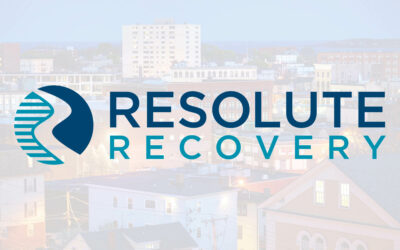One of the biggest hurdles individuals face in long-term recovery is relapse risk. The road to recovery from addiction is a journey with its own set of challenges. While overcoming the initial dependence on a substance is a significant accomplishment, maintaining sobriety requires ongoing effort.
Relapse, defined as a return to substance use after a period of abstinence, is a common occurrence. Studies suggest that relapse rates can range from 40% to 60% within the first year of recovery [1]. Resolute Recovery wants patients to have the understanding of the factors that contribute to relapse risk is crucial for building a strong foundation for lasting sobriety. Among these factors, stress stands out as a potent trigger.
How Does Stress Increase Relapse Risk?
Stress is a natural response to challenging or threatening situations. It triggers the release of hormones like cortisol and adrenaline, which prepare the body to fight or flee. While this response serves us well in the short term, chronic or unmanaged stress can have detrimental effects on our physical and mental health.
In the context of addiction recovery, stress can significantly raise an individual’s relapse risk. Here’s how:
- Intensifies Cravings: Stress activates the brain’s reward system, the same network involved in processing pleasure and motivation associated with substance use. This activation can trigger intense cravings for the addictive substance, making relapse more likely.
- Impairs Decision-Making: Under stress, the prefrontal cortex, responsible for rational thinking and impulse control, becomes compromised. This can lead to poor decision-making, increasing the vulnerability to relapse in high-pressure situations.
- Reduces Coping Capacity: Chronic stress depletes emotional and physical resources, making it harder to cope with difficult emotions and situations that might otherwise trigger drug or alcohol use.
It’s important to remember that the impact of stress on relapse risk is individual. Some people may be more susceptible to stress-induced relapse than others. Factors like the severity of the addiction, the length of sobriety, and the presence of co-occurring mental health conditions can all play a role.
Stress and Relapse: A Vicious Cycle
The relationship between stress and relapse is cyclical. Relapse itself can be a significant source of stress, leading to feelings of shame, guilt, and disappointment. This negative emotional state can then trigger further substance use to numb these emotions, perpetuating the cycle of relapse.
Identifying Stress Triggers: Uncovering the Culprits Behind Cravings
Recognizing your personal stress triggers is a crucial step in managing stress and reducing your relapse risk in recovery. These triggers are unique to each individual and can be anything that throws your emotional equilibrium off balance, leading to feelings of overwhelm, anxiety, or frustration. Here’s how to embark on a self-discovery mission to identify your stress triggers:
1. Mindfulness and Introspection:
- Journaling: Develop a habit of journaling regularly. Pay attention to your thoughts and emotions throughout the day, particularly when you feel stressed or experience cravings. Jot down the situations, events, or people associated with these feelings. Over time, patterns will emerge, revealing potential triggers.
- Mindful Check-Ins: Throughout the day, take a few moments to pause and assess your emotional state. Ask yourself, “Am I feeling stressed?” If the answer is yes, try to pinpoint what’s causing that stress. Is it a looming deadline, a difficult conversation, or something else entirely?
2. Analyzing Relapse Episodes (if applicable):
- If you’ve experienced relapse in the past, reflect on the circumstances leading up to it. Were there significant stressors present? Examining these situations can help you identify vulnerabilities and potential triggers for future episodes.
3. Common Stress Triggers for Individuals in Recovery:
While triggers are highly personal, some common culprits are:
- Work-Related Stress: Tight deadlines, heavy workloads, or a toxic work environment can all contribute to stress and relapse risk.
- Financial Strain: Worrying about bills, debt, or unemployment can be a significant source of stress.
- Relationship Conflict: Disagreements, arguments, or a lack of support within relationships can be emotionally draining and trigger cravings.
- Family Issues: Family dysfunction, conflict with loved ones, or caring for a sick family member can all be stressful.
- Environmental Cues: Places or situations associated with past substance use can be powerful triggers. This could be a bar you used to frequent, a neighborhood where you used to buy drugs, or even certain smells or music.
4. Be Specific – Go Beyond the Obvious:
Sometimes, stress triggers can be more subtle than major life events. They might be seemingly insignificant things like:
- Traffic Jams: Feeling stuck and frustrated can be a trigger for some people.
- Social Events: Large gatherings or situations with a lot of social pressure can be overwhelming.
- Feeling Overwhelmed: Even positive events, like planning a wedding or a vacation, can become stressful if you feel overloaded with responsibilities.
5. The Power of Recognition:
Once you’ve identified your stress triggers, you’ve gained valuable knowledge. Just by recognizing them, you’re better equipped to handle them proactively. You can develop coping mechanisms to deal with these situations in healthy ways, reducing your relapse risk.
Remember, identifying stress triggers is an ongoing process. As you progress in your recovery, new stressors might emerge. Stay vigilant, keep reflecting, and continuously update your personal “stress trigger list” to maintain your path to long-term sobriety.
Building Resilience: Effective Stress Management Strategies
Fortunately, there are effective strategies you can incorporate into your recovery journey to manage stress and reduce your relapse risk. Here are some key approaches:
- Mindfulness and Meditation: Mindfulness practices like meditation help cultivate present-moment awareness and emotional regulation skills. These skills can equip you to manage stress in a healthy and non-reactive way.
- Relaxation Techniques: Techniques like deep breathing, progressive muscle relaxation, and yoga can activate the body’s relaxation response, counteracting the physiological effects of stress.
- Regular Exercise: Physical activity is a powerful stress reliever. Engaging in regular exercise releases endorphins, natural mood elevators that can improve emotional well-being and reduce cravings.
- Healthy Sleep Habits: Chronic sleep deprivation can exacerbate stress and cravings. Aim for 7-8 hours of quality sleep each night to increase your resilience to stress.
- Building a Support Network: Connecting with supportive friends, family members, or a therapist can provide a safe space to share challenges and receive encouragement.
For a more in-depth exploration of these strategies and additional tips for managing stress in recovery, visit our page on Stress Management in Recovery [invalid URL removed].
Seeking Professional Help
If you find it difficult to manage stress on your own, don’t hesitate to seek professional help. Addiction treatment centers like Resolute Recovery offer a variety of resources and support programs to address the specific needs of individuals in recovery. Our team of qualified professionals can help you develop personalized stress management strategies and create a relapse prevention plan that works for you.
Remember, recovery is a continuous process. There will be bumps along the road, and experiencing stress is inevitable. However, by understanding the link between stress and relapse risk, incorporating effective stress management techniques, and seeking support when needed, you can build the resilience you need to stay on the path to long-term sobriety.





